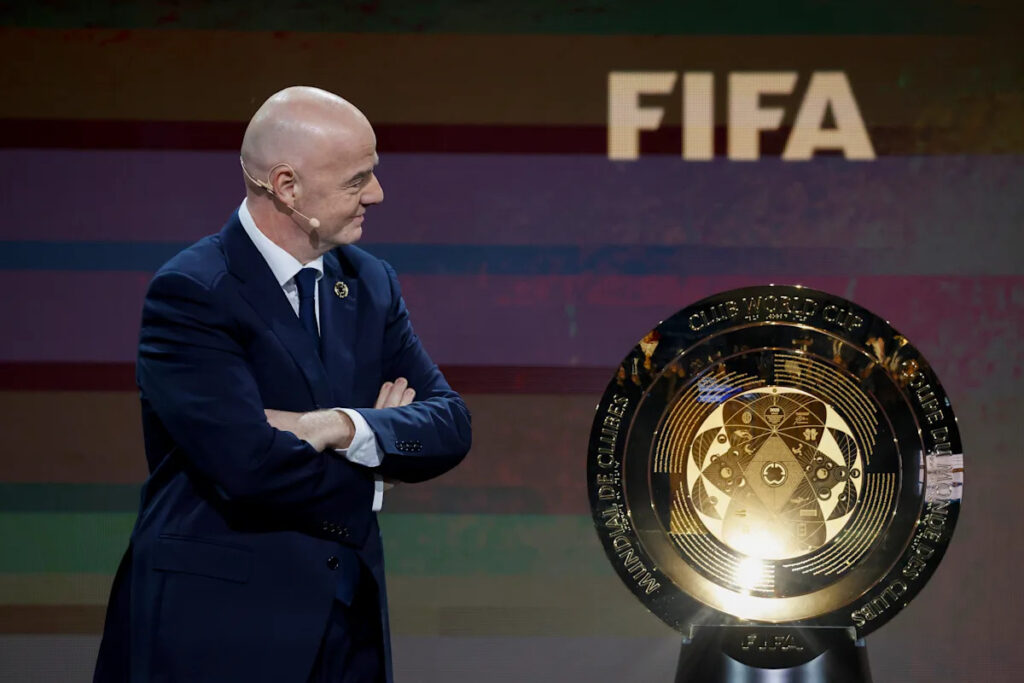Why does the Club World Cup exist?
There are two common answers to that question, and although they come from opposite sides of a roiling debate, at their core, they are actually quite similar.
One is money.
Advertisement
The other is that the Club World Cup, as FIFA likes to say, will help “make football truly global.”
One is cynical, the other noble. One despises the tournament, the other adores it. But they are both correct, because everything in modern soccer is about money; and money is the most powerful tool FIFA has in its effort to challenge a Eurocentric establishment that dominates the global game, and profits massively from it.
FIFA is soccer’s global governing body. It has 211 members, spanning every corner of Earth. It supports those members, the national soccer federations that govern the sport country by country. Part of its mission, then, is to generate revenue, which it can distribute to those 211 federations; or invest in programs that develop the sport.
So it believes — or, at least, its president, Gianni Infantino, seems to believe — that it should be the richest soccer organization on the planet.
Advertisement
And yet, from 2019 to 2022, FIFA made $7.6 billion. UEFA, soccer’s European governing body, made roughly $19 billion.
The Club World Cup, which begins Saturday in Miami, is the brainchild of FIFA president Gianni Infantino. (Photo by Marco Bello – FIFA/FIFA via Getty Images)
(Marco Bello – FIFA via Getty Images)
The English Premier League, one national competition alone, also outearns FIFA. And it distributes money to its members, 20 private, professional clubs. UEFA redistributes its riches with European clubs and its 55 national federations. The clubs and federations use the money to buy and develop players; players attract fans; fans pay to consume UEFA’s products, primarily the Champions League and the Euros; so sponsors pay to associate with them; media companies pay to broadcast them; UEFA’s revenues soar, the cycle spins, and soccer’s Eurocentrism solidifies.
Asia, Africa and the Americas — which supply the Champions League with talent but don’t benefit from it — get left behind.
Advertisement
“We say football, soccer, is a global sport,” Infantino told Yahoo Sports this spring. “But actually, if you scratch the surface, you see that the elite is very much concentrated in very few clubs in very few countries.
“I,” Infantino continued, “want to bring it to the entire world.”
And the way to do that, to slow or break the cycle, FIFA needs more money.
The main way to generate it, at this stage of soccer’s evolution, is to organize more games or, in this case, an entirely new competition involving the elite clubs and stars that already drive the global economy. Domestic leagues, like the Premier League, control (and monetize) most of the games that elite players play. UEFA controls most of the big ones. The Club World Cup is FIFA’s attempt to commercialize those players and their clubs in the same way that the Prem and UEFA do weekly from August through May.
Advertisement
Soccer did not need a Club World Cup — its calendar was already overcrowded, and the Champions League winner is widely considered the best club team in the world. But FIFA and Infantino needed market share.
FIFA, of course, controls World Cups, the biggest and most lucrative games of all. But World Cups only span a month every four years.
FIFA, therefore, stared at the barren interim years and concocted plans to fill them.
Infantino has championed those plans since the early years of his presidency. There were talks of a global nations league, akin to the one currently run by UEFA. There was a push to double the frequency of World Cups. Both met fierce resistance from the European establishment, and eventually perished.
Advertisement
But the Club World Cup weathered the resistance. It endured one false start, with the original plan to launch in China in 2021 scuppered by COVID. And now, four years later, it will soon have liftoff.
Although sponsors were lukewarm, and broadcasters were wary — “I think we were all skeptical during this entire process,” TelevisaUnivision executive Olek Loewenstein told Yahoo Sports — FIFA secured the necessary funding from DAZN, via a $1 billion global streaming deal. The funding allowed Infantino to promise tens of millions of dollars in prize money to top European clubs, the ones who’ll attract an audience.
And so, FIFA says, the 2025 tournament will break even. The hope is that this inaugural edition will pave the way to profits in 2029 and beyond. And those profits will help FIFA accomplish its mission.
That, essentially, is why the Club World Cup is happening.
Read the full article here



